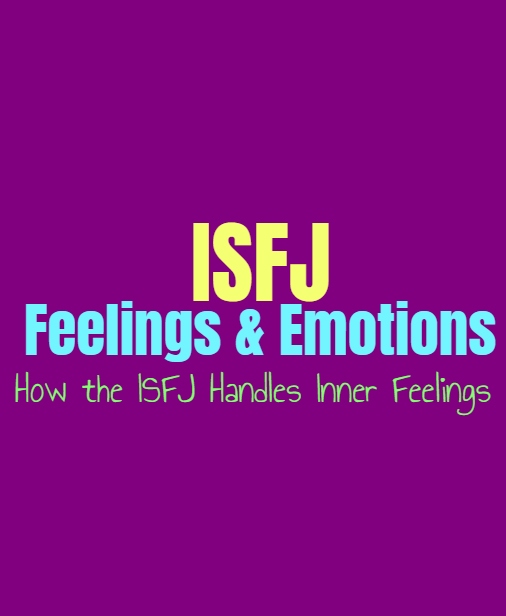ISFJ Feelings & Emotions: How the ISFJ Handles Inner Feelings
For the ISFJ, feelings and emotions are certainly important, but they aren’t ruled by them in quite the same way people might expect. For the ISFJ, there are different ways in which they process these emotions, as well as respond to them. Each person has their own unique processes when it comes to feelings, both their own and the feelings of others. It is important to consider not only the personality types but also the individual and what makes them unique and different.
They Possess a Lot of Empathy
ISFJs are actually rather empathetic people who care deeply for the emotions of others. Since they care so much about making others happy, emotions become truly important for the ISFJ. They value emotions and feel it is important to always take them into consideration before moving forward with things. They want to be sure that their actions do not hurt someone they care for, as ISFJs are very conscious of this. Their strong sense of empathy makes it so the ISFJ naturally wants to avoid hurting people or upsetting them in any way. Instead, they strive to make others happy and work hard to ensure they are pleasing the people they care for most.
ISFJs focus a lot of energy on ensuring that they don’t upset those around them and are very conscious of this. Since their auxiliary function is their Fe (extraverted feeling), focusing on the emotions of others is important and comes naturally. Instead of neglecting these feelings for their own, the ISFJ often does the opposite of this. They usually push aside their own inner emotions in hopes of tending to the needs of those around them. ISFJs are much more interested in pleasing others and creating a sense of harmony in their environment. This sense of harmony is deeply important for the ISFJ, so they work hard to maintain this. For the ISFJ ensuring that their environment is running smoothly and everyone around them is cared for is really something they value above most else. And so emotions definitely come into play here, the ISFJ needing to focus on the care and feelings of others to create this sense of peace around them. These feelings become a priority for the ISFJ since they need to tend to them to make sure that things don’t become messy or stressful around them. This does cause them to forget to focus on their own needs. Often, they don’t want their inner feelings to cause some sort of disruption.
They Are Practical
ISFJs do care about the emotions of others, but they are also very practical people. Sometimes they prefer to find these more practical ways of solving issues rather than using emotions to do so. Because of this, they might focus on tending to someone’s physical needs or want to find ways to solve their problems to ease their sadness or make them less upset. ISFJs can sometimes show affection this way as well, not always being as outwardly emotional as people might expect. When the ISFJ cares for someone, they often show this by going out of their way to please them and provide them with what they need. This can appear a bit more practical and logical than people expect, especially since ISFJs are so in tune with the emotions of others. Ultimately negative emotions are things they want to solve or fix in hopes of making this person happy once again.
This can make it challenging for the ISFJ when someone is upset because it disrupts the harmony, and it often feels like they have failed somehow. ISFJs feel successful when their loved ones are happy and comfortable and do not constantly appear stressed or hurt. They can sense this upset and want to seek out whatever means necessary to make things better and those around them happy.
They Don’t Focus Inward Much
ISFJs can sometimes be afraid of focusing on their own inner emotions, not wanting to dive down deep in this way. They focus so much on tending to others, so focusing on themselves can be a little bit frightening for them. Having to spend energy looking inward doesn’t always feel comfortable or natural for the ISFJ since their feeling function is so drawn to the emotions of others. They also feel a sense of guilt when it comes to their own inner emotions, not wanting to allow these feelings to upset anyone else. Sometimes the idea of focusing on their own emotions or inner desires can feel selfish to the ISFJ. It might feel as if they are taking advantage of those around them, exposing their own needs to hurting others in the process.
For the ISFJ, taking this time to prioritize themselves and their own inner needs can feel like they are being self-centered. They don’t want to be someone who expresses their own emotions at the expense of those around them. Sometimes their own inner feelings can seem a bit like a burden to the ISFJ, so they ignore them. They often find it easier to push these feelings aside and cover them up by focusing on the needs of those around them. This can certainly cause the ISFJ’s own inner emotions to fester and build up over time. Ultimately, neglecting their own personal needs can make the ISFJ feel stressed and a bit overwhelmed. They might have moments where they crash since they just haven’t spent enough time caring for themselves and tending to their own inner needs and desires. For the ISFJ, this is something that happens over a long period of time after they have spent too much energy ignoring these feelings and needs.
This Post is Brought To You By BetterHelp

This is SOO spot on